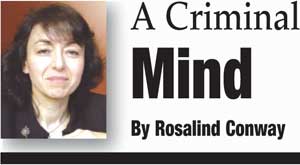As if practising criminal law isn’t difficult enough, with all of the ethical minefields, Charter arguments, and calls in the middle of the night, we have to figure out how to successfully represent our clients and have a bit in the bank to spare.

This is surprisingly hard to do for many criminal lawyers, whose clients assume they are all rich and privileged and can take on their cases for free.
Many years ago, my bespectacled husband was duty counsel in Toronto, politely making probably the lowest possible wage for a lawyer (rates have improved since then), when he was called “four eyes from Rosedale” by his client in the dock. One of my early clients suggested, after I had successfully resolved his drug case, that I should celebrate by taking him out to dinner. Another very violent and probably psychopathic female client asked to borrow $2,000, opining, “That’s what lawyers do for their clients.”
This is by way of background, because any of us who are comfortable now took a while getting there.
Some of the problems criminal lawyers encounter result from the pressure to build their practices, which, by nature, involve impecunious clients. However, a poor client may have a sympathetic relative who can assist, or he really may have more means than he says. If he claims he can come up with much of a retainer, he should at least apply for legal aid; after all, he may qualify.
When a lawyer undercharges, there may be a concomitant, though inappropriate, tendency to short change the work done on the case. I do not accept a really inadequate retainer. You can decline the case, or you could choose to do it pro bono, and at least feel good about it. Some work that I have done this way resulted in future benefits, on the “what goes around, comes around” principle.
One of the most common ways in which criminal lawyers undercharge is by quoting a block fee, rather than an hourly rate. Sometimes the lawyer has participated in what we call a “beauty pageant.” The client has been cold-calling to get the best rate. At this stage of my career, I just tell them to keep trying - I don’t charge the lowest rates.
The problem with quoting a block fee is that the lawyer is often basing it on what he thinks he might have made on the file if it had been covered by a legal aid certificate. This is the wrong approach, because legal aid has a significant pro bono aspect to it. The correct approach would be to multiply the lawyer’s hourly rate by the number of hours the type of case usually takes.
However, I think the best approach is to state one’s hourly rate and tell the client the number of hours that the case is estimated to take. Emphasize that this is just an estimate. The client provides a retainer, interim accounts are sent (i.e. after steps, like a pre-trial or a bail variation, are taken), and the retainer is replenished. Disclosure should not be reviewed without a retainer.
Cases that engage the “zero tolerance” policy in the Crown’s office, such as domestic violence cases, are not appropriate cases for block fees. Point out to the client that the Crown may be difficult to deal with. Realize that your client may also be difficult. Varying bail may be more time-consuming than finishing the case.
When you meet the client, know what your hourly rate is: I am surprised at how many criminal lawyers either have no hourly rate, or have the same one they have had since opening their practice.
One senior criminal lawyer taught me not to bother billing minor disbursements to your cash clients. It streamlines the billing process, the clients get something for nothing, and you won’t seem chintzy.
I allow time to pay, and I have very few uncollected debts, but read on for an explanation of that.
One very clever technique for collecting debts was gleaned from another senior criminal lawyer. It is hard to get paid when the case is over: the receivable gets stale and the clients tend to disappear. This lawyer would offer to discount the bill by a large amount (20 per cent or so) if it were paid by, say, Friday. The clients would run to the office to pay his bills.
And, if you didn’t get paid, well, don’t chase the rainbow. The phone will keep ringing, save your energy for the next call.
One last piece of advice: unlike one Ottawa colleague, don’t put up the cash bail for your new client.
Rosalind Conway practises criminal law in Ottawa. She can be reached at [email protected]

 This is surprisingly hard to do for many criminal lawyers, whose clients assume they are all rich and privileged and can take on their cases for free.
This is surprisingly hard to do for many criminal lawyers, whose clients assume they are all rich and privileged and can take on their cases for free.